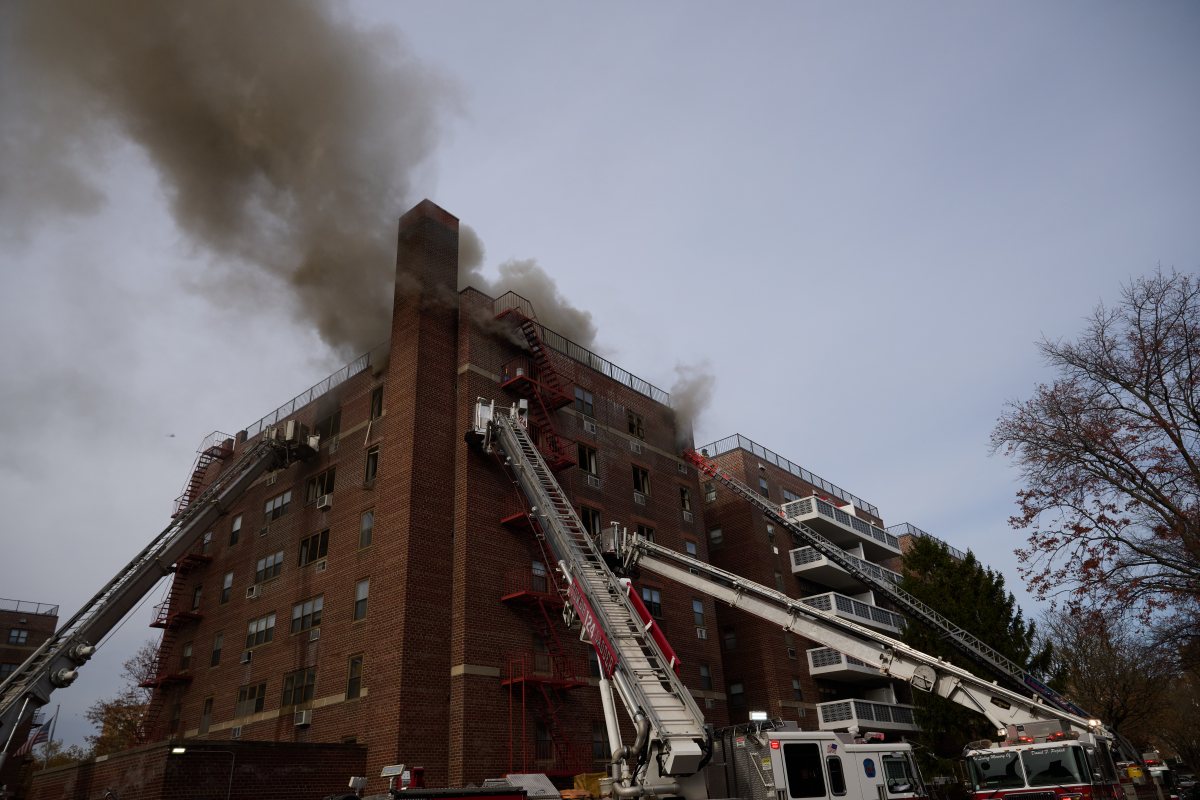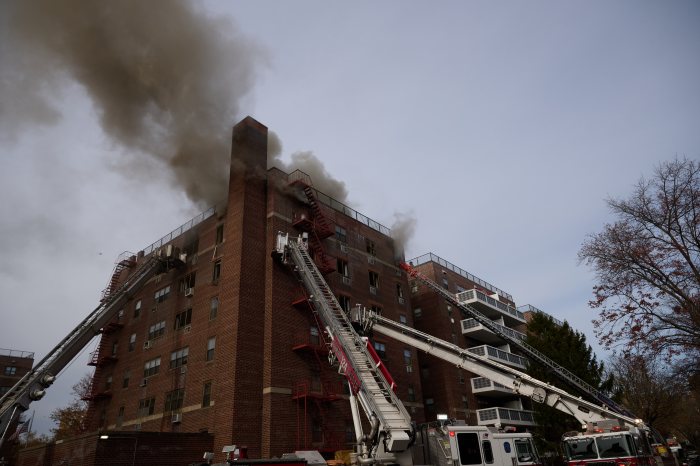By Lincoln Anderson
Dana Beal would rather be smoking a joint — but he’s in the joint.
Bleecker St. marijuana activist Beal continues to sit in jail in Wisconsin after police arrested him and Lance Ramer of Omaha, Nebraska, on Jan. 6 with an alleged 186 pounds of pot in a car that Ramer was driving and in which Beal was a passenger.
Beal has been unable to make his $50,000 bail, though his lawyer has been fighting to get the amount reduced. Bail bondsmen — who take a 10 percent payment to post bond — aren’t allowed in Wisconsin.
According to a source, Beal’s Wisconsin case probably won’t go to trial until May. A leader of the Yippie movement and a pot activist since the 1960’s, Beal also faces similar charges in a 2009 Nebraska case, when he was arrested with 150 pounds of marijuana in a vehicle he was riding in. That case could go to trial this month, the source said.
Beal last year told this newspaper that the weed in the Nebraska arrest was acquired in California, and that he was planning to deliver it to medical marijuana buyers’ clubs in Michigan and New York City.
He currently reportedly faces up to seven-and-a-half years in jail.
In the meantime, as he passes the time imprisoned, Beal is, well, being Beal. A passionate advocate of ibogaine — which he touts as a miracle cure for heroin addiction — Beal reportedly has heard that the son of the judge on his case might have a heroin problem, and if so, could benefit from treatment with the African-plant-derived drug.
“He’s driving his lawyer crazy talking about ibogaine,” said Paul DiRienzo, a former WBAI radio reporter and friend of Beal’s. “He thinks ibogaine might be useful for the judge’s son if he’s on heroin — now he can offer the judge’s son a cure for heroin. He would be willing to do ibogaine with him,” as in monitor the man’s dosing with the powerful drug.
Beal is also said to be giving advice to a man in a cell across from him detoxing from dope.
DiRienzo noted the judge on the Wisconsin case, William Dyke, is “a very conservative judge — he was the mayor of Madison in the ’60’s when they were beating up protesters.” In 1976, Dyke was the vice-presidential running mate of Lester Maddox, a staunch segregationist, in his bid for the U.S. presidency.
DiRienzo spoke to this newspaper last week a few days after having had a 20-mintue conversation with Beal and his lawyer, Bryon Walker. The calls are expensive for Beal, and Aron Kay, a.k.a. “The Yippie Pie Man,” has been raising money to pay for Beal’s daily phone calls and other jailhouse expenses.
DiRienzo said the hope is that the authorities will just release Beal and possibly only make him pay a fine. He said Walker will argue that, at this point, Beal simply can’t be rehabilitated, prison’s purported purpose.
“‘Why spend the time and money rehabilitating a 64-year-old pothead who’s never going to change?’ That’s what the lawyer said to me,” DiRienzo reported.
Beal, during the conversation, also complained that the guards aren’t letting him take food back to his cell. DiRienzo said Beal has always suffered from insomnia, and likes to eat small portions throughout the night. Not being allowed to do so is worsening his insomnia, DiRienzo said, plus, as a result, “he’s not getting roughage.”
DiRienzo said he couldn’t go into the case’s specifics.
“I don’t know what happened,” he said. “According to his lawyer, he’s innocent.”
“I’m not at liberty to talk about the case,” added Kay. “He’s being victimized by neo-nazis who don’t like marijuana, in general.”
People who want to send money to Beal, can do it by PayPal, via pieman@pieman.org, he said. There’s also a Facebook page, “Free Dana Beal Free Ourselves,” with more information on how to send cash to Beal. In addition to phone calls, the money allows Beal to pay for juices, sweets and the like.
While locked up in Wisconsin, Beal obviously won’t be able to organize the Global Marijuana March (a.k.a. The Million Marijuana March) on Sat., May 7, as he has done for years.
“We’re going to pull it together, one way or another,” assured Kay. “Nothing will stop it.”
Another Yippie source said, “Someone in Portland is picking up the slack.”
The pot march occurs in cities around the world. Organizers for this year’s New York event are reportedly seeking a permit to march from Washington Square Park to Battery Park City.
If there’s an upside to his time in jail, Beal at least gets to watch four TV news channels there, noted the Yippie source, adding, “That’s more than he gets at 9 Bleecker St.” During the Super Bowl, Beal reportedly was telling his prison mates to pipe down, oblivious to the fact that the Packers’ playing in the game was an event of historic proportions in Wisconsin.
Beal’s arrest was also big news at least in part of the “Badger State,” in Iowa County, 10 miles outside Madison. According to a Jan. 14 article in the Dodgeville Chronicle (“Barneveld police make huge drug bust”), on Jan. 6 a police officer stopped the vehicle Beal was in because it had a broken taillight and some expired registration plates. Initially, Police Officer Nick Zimpel was prepared to issue just a warning, “perhaps a citation,” but he said, “I approached the vehicle and could smell an odor of marijuana coming, and at that time, I called for backup.” Ava, a K-9 police dog, was called in and, not surprisingly, immediately “hit on the vehicle.” Officers subsequently found a duffel bag with a “brick” of marijuana, with the whole haul of pot having a street value of more than $750,000.
A follow-up Dodgeville Chronicle article on Jan. 21 (“Who really is Irvin Dana Beal?”) stated, “Federal investigators are being careful with what information is released [about Beal’s case]. They feel it could compromise an investigation into a national drug ring which runs from California to New York with multiple locations.”
However, to hear Beal tell it, while he does admittedly transport cannabis cross-country, it’s marijuana for medical purposes. He calls people like himself “angels” for bringing pot to those who need it, and says it’s a crime to prosecute them for doing so.
Speaking last year, referring to his October 2009 Nebraska bust, Beal told this newspaper, “I’m just really offended by these a—holes in Nebraska saying it’s not all medical marijuana.” That is: that all the pot in the car was going to be used for medical purposes.
He’s been a medical marijuana advocate for more than two decades. He showed a New York newspaper article from the 1980’s, with a photo of him walking down the street, with a satchel over his shoulder, on his way to make a health-related reefer delivery.
Last July, Beal and medical marijuana advocates gathered on the City Hall steps in Lower Manhattan for a press conference to condemn comments made by Bridget Brennan, the New York special narcotics prosecutor, against a perennially pending bill to legalize medical marijuana here. Last year, advocates had hoped the bill finally had a chance to pass.
Those at the rally included AIDS sufferers, who said pot restored their appetites and kept them from wasting away; and a woman with M.S. and another, a survivor of third-stage breast cancer, who said marijuana eased the pain they felt from their afflictions and, in the case, of the woman who had fought cancer, painful radiation treatments.
Basically, Beal said, he supplied pot to medical marijuana buyers’ clubs, not only in New York, but also in other places, like Michigan.
“Three-and-a-half clubs [in New York] are connected to me,” he said. Beal said he supplied the clubs twice weekly, at locations in Manhattan and “the Village,” but didn’t want to get more specific. “They’re based on Tupperware parties,” he said. “More than 400 people in New York City are in some kind of [medical marijuana] club.”
At the press conference, he stated, “Medical marijuana is well established here and won’t be affected if I go to jail — except it might cost a little more. I was keeping the cost down.”
Beal said he likes to buy pot in California because it’s less expensive, adding, “I prefer stuff that’s grown outdoors. I prefer stuff that’s strong.” People with health needs need strong pot in order to benefit from the maximum medical effect, he explained. Beal noted he has to get the pot cross-country quickly, or it will start to “self-combust,” due to the volatile oils in it.
Told this, Special Narcotics Prosecutor Brennan scoffed that it sounded like “Cheech and Chong.” In an interview, Brennan charged that medical marijuana users mainly covet “the big bang to the head” that pot provides. Among other things, she said marijuana should first be removed from Schedule 1 of the Controlled Substances Act, allowing it to be tested for medical properties by federal researchers, only after which it could potentially be legalized for medical use.
At the end of the City Hall press conference last July, Beal asked everyone to hold up their “Cannabis Patients Registry” cards — but no one did.
“That was embarrassing — everybody forgot to bring their cards,” he said.
Later, he said he realized they were afraid to show their cards because they were out of date. He prints them up and laminates them at the Yippie Cafe, where he lives, at 9 Bleecker St. in Noho. The card’s front includes the person’s photo, while the back lists his or her medical condition and special needs.
As the Dodgeville Chronicle noted, Beal isn’t unknown in Wisconsin, where he first appeared more than 40 years ago as a leader of Yippie protests against the Vietnam War.
In fact, DiRienzo said, he met both Beal and Kay in Madison, which was known for its radicalism — “more radical than Berkeley,” he noted. While he was a student at Madison, DiRienzo said he met Beal during a conference about the 1980’s, where Beal argued with the organizer and took over the event. DiRienzo said he first made the acquaintance of “The Yippie Pie Man” when Kay pied Madison’s mayor.
DiRienzo said, if he has to make a choice, Beal would prefer to serve time in Wisconsin since it’s an “intellectual state,” whereas, in Nebraska, “they don’t like New Yorkers.”
A month after the press conference, Beal stopped by this newspaper’s office to introduce John Pylka, who was visiting from Washington, D.C. Pylka is a member there of the Cannabis Patients Registry, a medical marijuana buyers’ club, for which Beal said he supplied pot.
At one point, Pylka unfolded and held out a small Tibetan compassion flag (actually, a series of small flags tied together on a string), then said, “It takes a lot of guts to do this. We wouldn’t be doing this if the federal government allowed this.”
“See,” Beal said later, as they were leaving through the door, “there really is an East Coast medical marijuana network.”




































